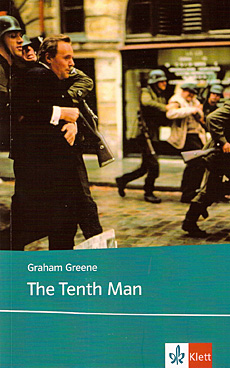Without doubt Graham Greene is one of the most popular English writers of the 20th century. Although popularity is neither necessarily an advantage nor the only criterion for the value of a work of art, most critics agree that Greene´s novels will endure the tests of time.
Greene himself dubbed some of them "entertainments" to distinguish them from his more serious works. However, this should not blind the reader to the fact that seriousness is always present in his novels, for Greene uses typical elements of 'escape literature' to deliver serious messages.
His novels deal with themes such as man´s inward anguish and his struggle with an uneasy conscience due to a sense of personal failure. Most of his fictional characters live in a gloomy, bleak world of guilt and remorse. Often even the salvation they desperately long for is just as joyless as the damnation they try to escape from.
THE TENTH MAN is actually a symbiosis of the crime novel and the 'novel proper'. This could explain the author´s comment in his introduction to The Tenth Man: " I found this forgotten story very readable - indeed I prefer it in many ways to The Third Man."
As Paul O´Prey rightly points out in A Reader´s Guide to Graham Greene " many of Greene´s major themes are incorporated into the story in miniature; betrayal, forgiveness, the moment of weakness or cowardice 'which happens to everyone once and when it happens, you know what you´ve been all your life'." The story is basically ironic. The initial absurd and contradictory situation, when Janvier sacrifices his life to purchase a fortune while Chavel sacrifices his fortune to buy his life, entails other paradoxes or ironies of situation.
Moreover, the novel is evocative of a variety of atmospheres. While the scenes in prison create an atmospere based on the vaccilation between boredom and fear on the one hand, and hope and despair on the other hand, the later scenes characterize the typical atmosphere in post-war France.

Graham Greene, The Tenth Man
INFORMATIVE ITEMS
1. Plot (synopsis)
2. History of the Novel
3. Evaluation
4. Cultural-historical Setting of the novel
The war and the yoke of occupation have led to exhaustion and hopelessness and the collaboration of the Vichy government has left the country a victim of distrust, suspicion and denunciation.
The novel was made into a TV film of the same name in 1988, which many critics would maintain lacks the atmoshere, expressiveness and quality of the original. It is this discrepancy that makes it worthwhile comparing the film to the novel, an exercise which should make students aware of the true value of Greene´s "The Tenth Man".
Contact: info@new-english-readers.de
